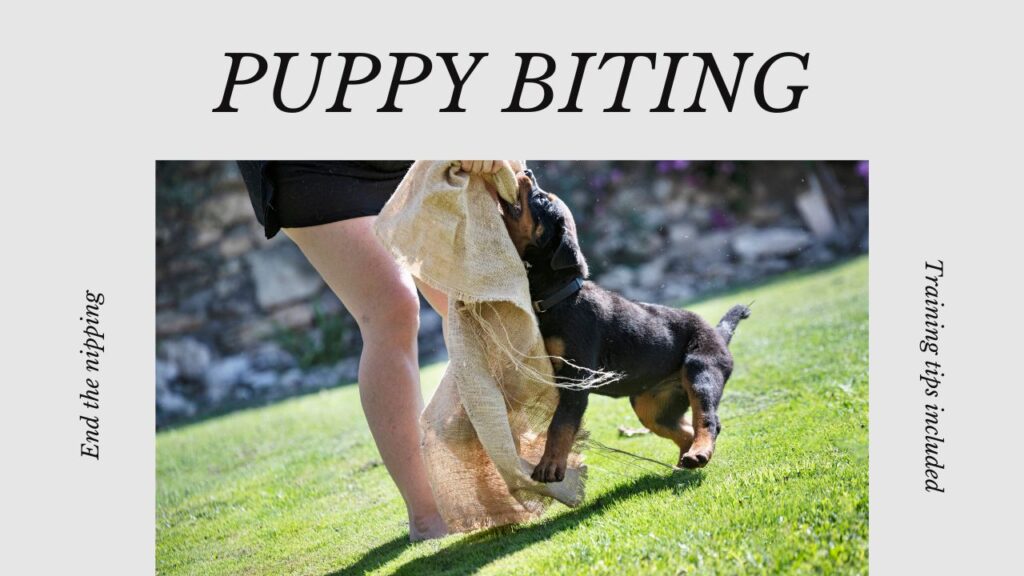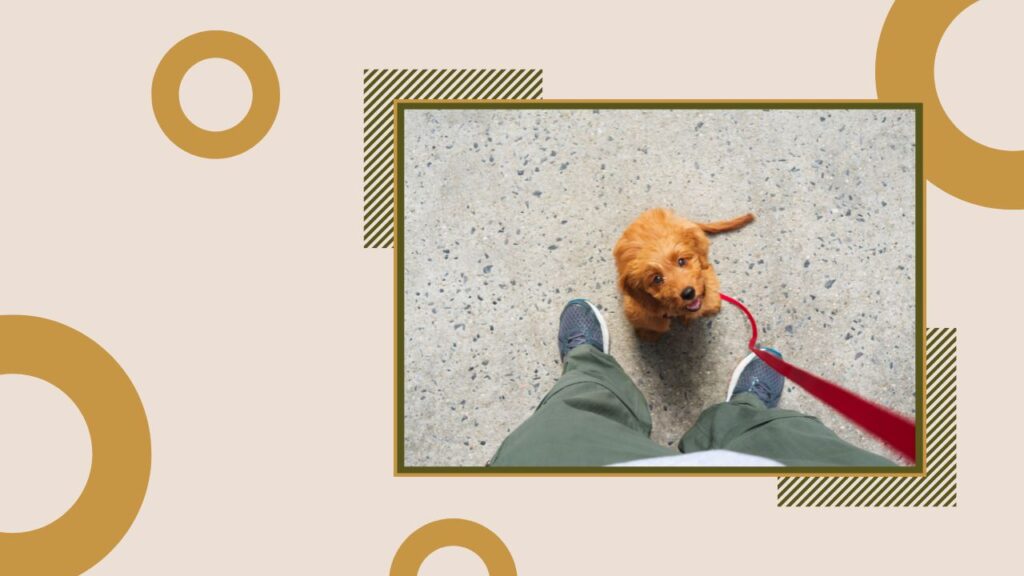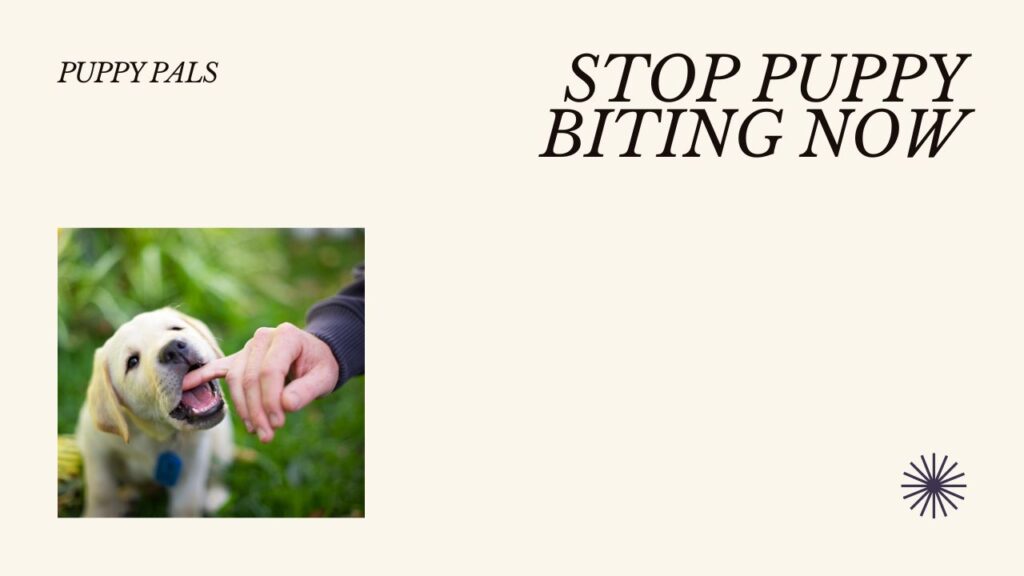The moment you feel your puppy’s teeth touch you, let out a high-pitched yelp. Then, just walk away from them and ignore them for about 30 to 60 seconds. If your puppy keeps biting, you can give them a time-out by gently placing them in their crate. This gives them a chance to calm down and helps prevent more biting.
It’s really important not to yell at your puppy, tap their nose, or hold their mouth shut when they bite. That’ll just confuse them and make them distrust you. Instead, stay calm and don’t retaliate. Show your puppy that their biting hurts you! It’s okay to be a little dramatic—making a big fuss about the pain, just like other puppies would do, can help them understand.
Why Do Puppies Bite?
It’s normal for puppies to use their teeth during play and exploration. It’s how they learn about the world, and it plays an important role in their development. Here are a few reasons why puppies bite.

They’re Exploring the World
Puppies learn by biting things, including people, other puppies, and objects. Biting helps them understand how hard they can bite, what something tastes like, and whether they should change their behavior. Based on the feedback they get—like the taste or the reaction they receive—puppies may continue biting, adjust their bite, or stop altogether.
Your Puppy Is Teething
When your puppy is 12–16 weeks old, their gums may be sore during this time. Because of this, puppy biting tends to peak around 13 weeks of age. During this time, you’re likely to see an increase in chewing on objects—including you, your clothes, and maybe even your hair.
It’s Play Behavior
Some puppies nip or bite to entice play. When puppies bite each other, they learn a very important skill: bite inhibition. With play biting, puppies learn how much pressure they can apply with their teeth and what happens when they bite too hard. For example, if one puppy bites too hard, the other will cry out and stop playing. This teaches the biting puppy to be gentler next time.
How To Get a Puppy to Stop Biting
Curbing your puppy’s biting and nipping largely depends on why they’re doing it in the first place. Here’s how to stop your puppy from biting for common reasons
If Your Puppy’s Chewing Your Belongings
If your puppy keeps biting during play, leave the area for 30 seconds. When you return, use a toy to distract them. Be ready to repeat this if needed. Keep in mind that tired puppies often bite more, so they may need rest. Avoid letting your puppy chase or bite your hands or feet, as this can lead to more painful biting as they grow bigger.
If Your Puppy’s Teething
Puppy teething toys ease sore gums and are typically made with softer plastic so they won’t hurt the baby teeth or incoming adult teeth.
If Your Puppy’s Biting You to Play

If your puppy bites during play and won’t stop, immediately remove yourself from the area for about 30 seconds. When you return, bring a toy to redirect their attention, and be prepared to repeat this process if necessary. Remember, tired puppies tend to bite more, so they may need rest. Also, avoid encouraging biting by letting your puppy chase or nip at your hands or feet, as this behavior can lead to more painful bites as they grow.
Tips for Stopping Puppy Biting
While puppy biting is a normal part of a dog’s development, it’s important that you manage the behavior appropriately. You need to be patient and consistent. If you are frustrated by your puppy’s behavior, seek professional help from a certified behavior consultant, an applied animal behaviorist, your vet, or a veterinary behaviorist.
Here are some tips for success in stopping your puppy from biting you:
Avoid Harsh Verbal or Physical Corrections
Verbal and physical corrections do not teach your puppy how to behave; they only teach a puppy to suppress a behavior or escalate their behavior to defend themselves. Using punishment to train your puppy will lead to fear and anxiety. Always use positive reinforcement when training your dog, whether it’s to stop your puppy from biting or teaching basic cues like “sit” and “stay.”
Give Your Puppy Age-Appropriate Toys
To train your puppy effectively, start by offering a variety of safe toys, such as rubber, rope, or squeaky toys, to see which ones they enjoy most. Encourage play by moving the toy around and praising your puppy when they engage with it. If your puppy bites your hand or clothing,
immediately stop the interaction. Avoid pulling away but instead stop playing altogether. If they persist in biting your feet or legs, leave the room briefly. After 20–30 seconds, return and offer a toy for them to play with. Through repetition, your puppy will learn that biting toys is more rewarding than biting you.
Try Puppy Socialization Classes

Puppy socialization classes are an important part of your puppy’s learning. In these classes, puppies learn to understand other dogs’ body language, control their biting, and interact with other young dogs. The controlled environment helps them figure out what is acceptable play and what isn’t. It’s important to ensure that all participants in the class are actually puppies—dogs with adult teeth shouldn’t be included.
Nipping and Biting in Adult Dogs
Teaching bite control is easier with puppies because their jaws are not fully developed. If this training is neglected, they may grow into dogs that bite hard enough to cause bruising or injury. It’s essential to provide appropriate objects for them to chew on, as this helps in teaching bite inhibition. Without proper training, puppies can become harder to manage as adolescents with poor bite control. If your dog has adult teeth and continues to bite painfully despite your efforts, it’s important to seek help from a certified behavior consultant or veterinary behaviorist.
Puppy Biting FAQs
At what age do puppies stop biting?
Puppy biting typically peaks around 12 to 13 weeks of age, coinciding with their transition from baby teeth to adult teeth. By the time they reach 7 months, all adult teeth are usually in place, and teething should no longer contribute to biting behavior. At this stage, consistent and clear responses from people and other dogs should help reduce biting. However, if puppies learn that biting gets them what they want, this behavior may continue into adulthood. Additionally, if your puppy isn’t biting anything at all, it may indicate an underlying problem, so it’s advisable to consult a vet or a behavior professional for an evaluation.
How do I get my puppy to stop biting my hands and feet?
Puppies often chase and bite hands and feet because they move frequently. To discourage this behavior, it’s important to always play with your puppy using toys, providing them with appropriate items to bite. Additionally, walking calmly can help prevent your feet from becoming targets. If your puppy bites your hands while you’re petting them, redirect them to a toy or a suitable chewing item. However, if their biting includes holding tightly, showing tension, deep growling, or shaking their head, it’s essential to contact a behavior professional for assistance.
How do I stop my puppy from biting my ankles when I walk?
If your puppy is biting your ankles, try dragging a tug toy on the floor so they target that instead. Another way to stop puppy biting is to encourage the puppy to follow you, with their eyes looking up, while you reinforce the behavior with food.











No Comment! Be the first one.